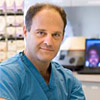 The below question is answered by Dr. Richard M. Kline of The Center for Natural Breast Reconstruction.
The below question is answered by Dr. Richard M. Kline of The Center for Natural Breast Reconstruction.
I am weighing my options for breast reconstructions and considering silicone implants. What should I know before I continue—what questions should I ask a doctor?
Silicone or saline implants, while generally very safe from a medical perspective, are still subject to some complications. The most common problem is that either type implant can develop a hard capsule of scar tissue around it (capsular contracture), which is sometimes painful, and makes the breast mound hard (and often unattractive). Generally speaking, the thicker and more normal the soft tissue covering around them, the better result implants tend to give when used for reconstruction. The presence of radiation injury greatly decreases the chances of success when using either silicone or saline implants for breast reconstruction, and flaps may be a better alternative in that case.
-Dr. Richard M. Kline Jr.
The Center for Natural Breast Reconstruction.
Have questions for our surgeons? Submit your questions today and get answers straight from our surgical team! No matter where you are in your reconstruction process, we are here to help!











